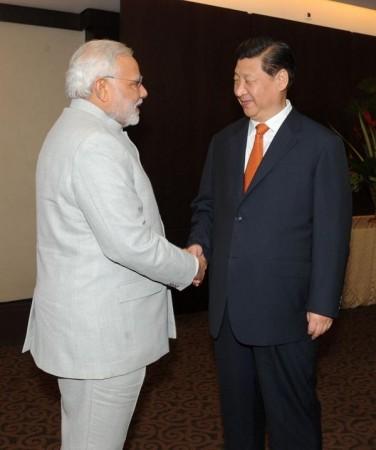
Even as Prime Minister Narendra Modi discussed the burning border issue in his first interaction with Chinese President Xi Jinping on Monday after he came to power, there seem to be no signs of an end to incursions by the Chinese Army into Indian Territory.
In just the last three days, two incursions by the People's Liberation Army have been reported in Ladakh, not long after Chinese troops had attempted to enter Indian Territory on the Pangong Lake in eastern Ladakh last month.
Chinese troops are reported to have entered Charding Nilu Nullah Junction (CNNJ) in Demchok sector on Tuesday claiming it to be Chinese territory, security establishment sources told the Times of India. This came just a day after the Modi-Jinping meet.
India had conveyed its concerns about the frequent border incursions by the Chinese Army during the bilateral meet between Modi and Jinping that took place just before the 6th BRICS Summit began in Brasilia in Brazil. The two leaders had agreed to work towards a peaceful conflict resolution.
"Both sides emphasised on the need to find a solution to the Boundary Question. The Prime Minister stressed the importance of strengthening mutual trust and confidence, and maintaining peace and tranquility on the border," read a statement issued by the Prime Minister's Office a little after the meet.
This only goes on to show that China is least concerned about keeping its word and restraining its army from walking into Indian territory, despite relations looking up between the two countries with the new Modi government at the centre.
Not just Modi, but Indian Army Chief General Bikram Singh had himself asked for a check on incursions at the time of his visit to China earlier this month. Singh reportedly pushed for the implementation of the Border Defence Cooperation Agreement that was signed by the two countries last October, to ensure both countries work towards containing trespassing along the Line of Actual Control.
The Agreement seemed to have been nothing, but a token policy by the Chinese government, Foreign Policy had reported. It had described the Agreement as nothing but a "Chinese plot to subvert the debate surrounding its recent strategic offensive behavior."
It had reported that China's intrusion deep isnide the Depsang Plateau in eastern Ladakh in April 2013 had occured despite several meetings of the India-China Joint Working Group and four confidence-building agreements, signed in 1993, 1996, 2005, and 2012.
This gives enough proof to believe that China is not committed to follow on its word given each time during a diplomatic meet or in an agreement, and Chinese incursions will continue unless the Indian government decides to discard its soft stance.

















